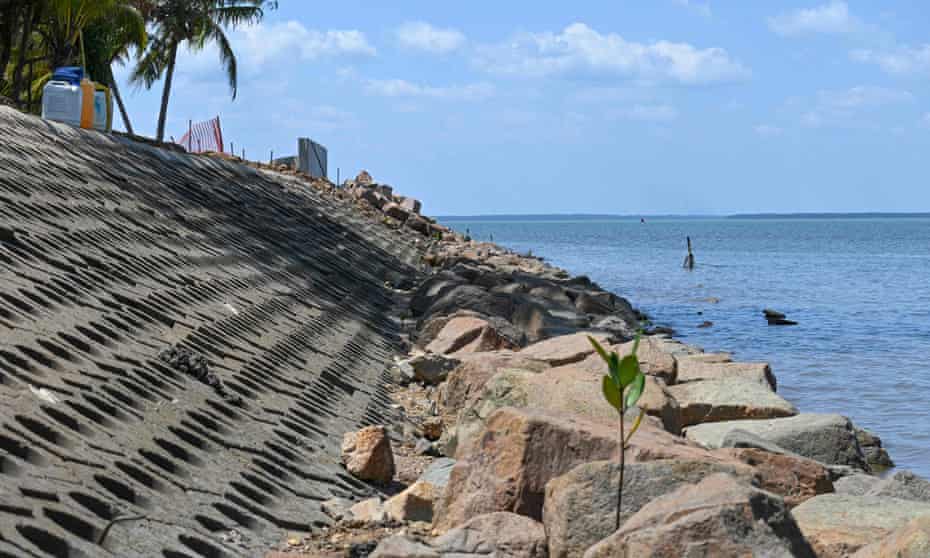As Australia continues to fail on climate, those on the frontline are running out of options, and time
Court action from Torres Strait leaders over Australia’s failure to cut emissions comes with an urgency that is impossible to overstate

With the UN climate summit now less than a week away, the Australian government is failing to meet even the exceptionally low expectations on climate action reserved for Australia’s political leaders. Although Scott Morrison’s government has announced a highly qualified net zero target, it has failed to address its manifestly inadequate carbon emissions reduction target for 2030 despite clear warnings from scientists that global emissions need to be halved in the next decade. Meanwhile leaked documents suggest Australian officials have been trying to delete references to phasing out coal-fired power stations from an upcoming Intergovernmental Panel on Climate Change report.
For Morrison, the UN summit and heightened international scrutiny of Australia’s abysmal federal climate policies cannot be over soon enough. However, there will be no escaping accountability for his government’s actions at home, as this week First Nations’ leaders from the Torres Strait have filed a groundbreaking court case challenging Australia’s failure to cut emissions and avert the destruction of their homes and communities.
Their case makes for harrowing reading. Homes and villages in the Torres Strait are already being flooded by rising seas; saltwater is seeping into people’s gardens and killing their vegetables; cemeteries and sacred sites are being eroded by the sea; sea walls constructed to stem the ever rising tides aren’t working. If global temperatures continue to increase, then communities whose ancestors have lived in the Torres Strait for more than 65,000 years will be forced to flee as their homes disappear beneath the waves. It’s hard to describe the trauma that this would have on a people whose way of life and culture is drawn from their lasting connection to the land. The plaintiffs in this case describe it as cultural genocide, another stolen generation.
It is no surprise that the courts are increasingly being asked to consider whether governments are doing enough to protect people from the impacts of climate change. The climate crisis has all of the hallmarks of a classic negligence issue: after all, the harm climate change will cause is substantial, foreseeable and preventable. Moreover, in numerous cases around the world, courts have concluded that governments owe the public a duty of care in the context of climate change.
These cases get to the heart of the problem – what is the harm, and what needs to be done to prevent it? Or in the case of the Torres Strait Islanders, what does Australia need to do to make a fair contribution to climate action and maintain a safe climate for its citizens? Experts state that Australia, which has some of the world’s highest per capita emissions, would need to cut emissions by three quarters (compared to 2005 levels) this decade, and achieve net zero by 2035, to avert disaster on its own shores. This exposes how woefully inadequate the government’s current targets are.
All over the world, people are growing increasingly frustrated by the failure of their political leaders to address the climate crisis, despite the very real impacts that can be felt all around us. As a result, they are taking their governments to court – and they are winning. When my colleagues at the Urgenda Foundation in the Netherlands helped hundreds of people to sue the Dutch government, the odds were stacked against them. Yet they won and transformed climate policy in the Netherlands forever, leading to the government slashing emissions and investing billions in carbon-cutting measures. The case cut through the politics, put the facts on the record and led to real change. Cases in Belgium, Colombia, France, Germany and Ireland have had similar success in moving the conversation from government spin to clarity about the level of ambition we need right now to avert disaster. In Australia, there have been some important legal breakthroughs in cases in the past year as well.
If successful, this latest case would lead to desperately needed action on climate in Australia, the urgency of which is impossible to overstate. At a minimum, it will force a conversation about the facts. What is at stake if our leaders continue to lead us down this path? What is needed to avert catastrophe? Why is the government failing to act? But whether the Torres Strait Islanders win or lose, this case won’t be the last time the Australian courts are asked to intervene. Because the government shows no appetite for governing and ordinary Australians on the frontline of the climate crisis are running out of options – and time.